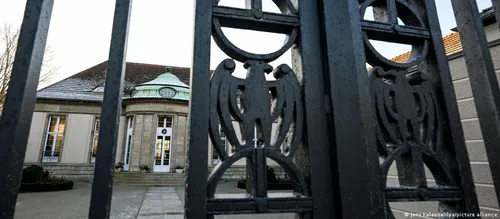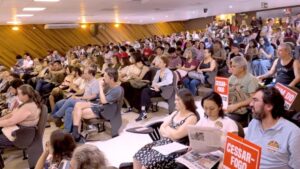
Politicians from the Alternative for Germany (AfD) – an acronym that has a portion of its structures already under observation by German intelligence due to well-founded suspicion of affront to the Constitution and the German democratic order – are accused of participating in a meeting with neo-Nazis in which it would have been the mass deportation of millions of immigrants and “unassimilated citizens” (read: naturalized Germans) was discussed.
The case was revealed by a report from the investigative journalism website Correctiv published last Wednesday (10/01).
According to the report, the meeting focused on a topic that participants referred to as “remigration”, that is: the return, forced or by other means, of “migrants” to their place of origin – regardless of whether they have German citizenship or It is not about whether or not they were born and lived their entire lives in Germany.
Detail: according to the definition of the German Statistics Department, practically one in every four inhabitants of the country (24.3%) has a migratory background – either because they were born without German citizenship or because they have at least one of the two parents who fits this definition. This includes both people who were born in the country and those who migrated to Germany. The concept covers 20.2 million people.
Populists and right-wing extremists use the euphemism “remigration” to refer to the mass deportation and expulsion of migrants and their descendants. According to Correctiv, the invitation to the meeting held in Potsdam mentioned that a “general concept, in the sense of a plan”, would be discussed.
References were made to the expulsion of asylum seekers, foreigners with residence permits and Germans with a migration background who do not adapt to society.
Why the ultra-right’s “delusional” plans caused outrage
The plan contradicts the fundamental rights provided for in the Constitution. One of them is that no one can be discriminated against based on their family, ethnic and national origin, race or language.
For this reason, the report about the meeting caused outrage across the political spectrum, from the Left party to the conservatives of the CDU/CSU alliance. “The plans to expel millions of people evoke the darkest chapter in German history,” wrote the leader of the Liberal Party (FDP), Christian Dürr, alluding to the deportations and murders of millions, mainly Jews, by Nazis between 1933 and 1945.
It has long been known that right-wing radicals act to provoke debates in German society that stretch the limits of what is acceptable, pushing to rehabilitate subjects previously banned from the public sphere.
Who participated in the meeting?
According to Correctiv, the meeting at the Landhaus Adlon establishment was organized on November 25, 2023 by retired dentist and far-right activist Gernot Mörig and businessman Hans-Christian Limmer. From the participants, they asked for a donation of 5 thousand euros (R$ 26.6 thousand).
Advisor to AfD co-leader Alice Weidel, Roland Hartwig was one of those who reportedly accepted the invitation, as was Gerrit Huy, an AfD member with a seat in the Bundestag, the lower house of the German parliament. At the state level, Ulrich Siegmund, co-leader of the AfD bench in the Saxony-Anhalt parliament, reportedly attended the meeting.
Some members of Germany’s largest opposition party, the conservative CDU, were also reportedly present at the meeting. The party’s general secretary, Carsten Linnenmann, threatened to take action against these people.
The most notable participant at the meeting, however, would be the Austrian Martin Sellner. Considered the head behind the ultra-right “Identitarian Movement” and popular on social media, he would have presented his ideas on “remigration”.
In several essays, Sellner wrote about the need to deport “asylum fraudsters,” “non-citizens who pose a cultural, economic, and criminal burden,” and “unassimilated naturalized citizens.”
What is the AfD’s position on expulsion and deportation of migrants
“We must finally deport in a big way those who have no right to stay in Germany,” said Federal Chancellor and Social Democrat Olaf Scholz in a famous interview with Der Spiegel magazine in October 2023.
The declaration, a response to calls in public opinion to reduce the flow of asylum seekers, reflects the vision of many politicians who are part of the coalition government and sectors of the opposition CDU/CSU. The CDU also called for the revocation of German passports of dual nationals who commit crimes.
AfD politicians have long called for mass deportations and have embraced the term “remigration.” In its manifesto for the 2021 federal elections, the party mentioned a “remigration agenda”, without however detailing what exactly this would mean.
On Wednesday (10/01), the party posted a message on X in which it propagated a “consistent and consistent policy of remigration” and “passport revocation and remigration of criminals”.
The next day, AfD co-leader Tino Chrupalla wrote in response to the Correctiv report: “We invite Germans with a migration background to join us and make change for the good.”
The last time a party was banned in Germany was in 1956
Since the Potsdam meeting was revealed, voices have emerged in the public debate demanding that the AfD be banned. According to opinion polls, half of Germans support the idea.
Minister of the Interior in the state of Baden-Württemberg and member of the CDU, Thomas Strol says there are good reasons for the German secret service to keep an eye on the AfD. “When the Federal Department for the Protection of the Constitution and security agencies see enough elements to open a process to ban the acronym, then the question of the ban will be answered,” he declared on public radio SWR.
Only Germany’s Federal Constitutional Court can ban a political party. The last time this happened was in 1956, with the communist KPD. According to the Constitution, a party is only considered unconstitutional if it endangers the existence of the Federal Republic of Germany or explicitly attempts to eliminate the liberal-democratic order.
Even the NPD, a neo-Nazi party recognized by the Constitutional Court as openly contrary to the liberal-democratic order, was not banned. In a 2017 decision, the court justified the rejection of the case by claiming that it did not see elements for a “successful implementation of its objectives hostile to the Constitution”.
“We need to fight the AfD with political means, not in the courts,” CDU leader Friedrich Merz told the Rhein-Neckar-Zeitung on Thursday. Merz argues that filing a lawsuit to ban the acronym could give her the opportunity to pose as a victim in the public eye.
The AfD currently appears as the second most popular party in national polls, with more than 20% of voting intentions. Polls in three states that will have elections in September this year – Thuringia, Saxony and Brandenburg, the three in the east of the country – even show the AfD as the favorite, supported by more than 30% of voters.

Source: www.brasildefato.com.br

